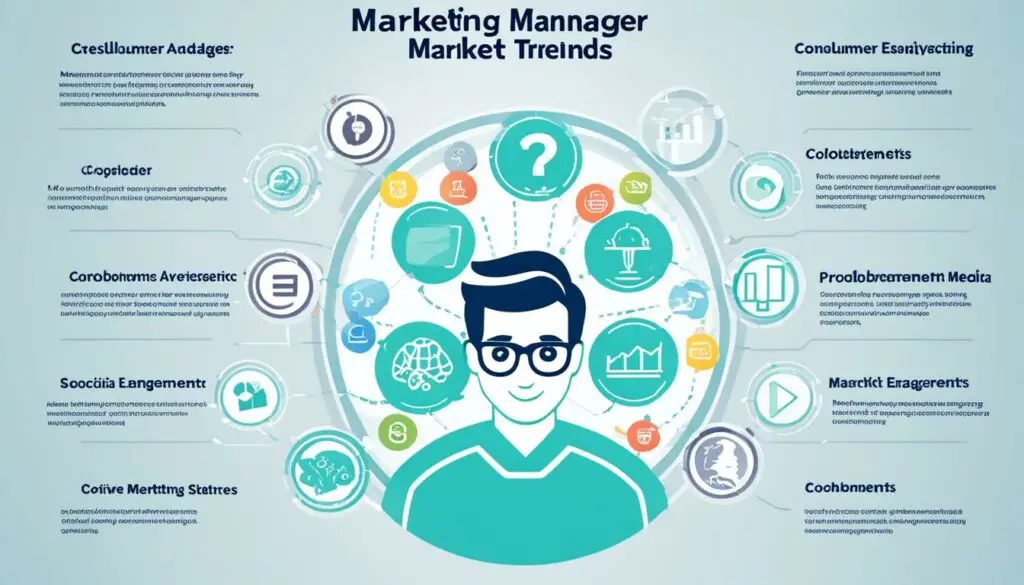The roles of a Marketing Director and a Marketing Manager are often used interchangeably, but they represent distinct positions with unique responsibilities. In this article, we will explore the key differences between a Marketing Director and a Marketing Manager, including their job descriptions, responsibilities, salary differences, qualifications, skills, and career paths. We will also discuss the collaborative nature of their roles and the importance of synergy in a marketing department.
Key Takeaways:
- The roles of a Marketing Director and a Marketing Manager are distinct, with different levels of responsibility.
- Marketing Directors focus on strategic planning and vision setting, while Marketing Managers handle tactical execution and day-to-day operations.
- Marketing Directors have a higher salary range compared to Marketing Managers.
- Marketing Directors require extensive experience and may have advanced degrees, while Marketing Managers need strong execution and project management skills.
- Collaboration between Marketing Directors and Marketing Managers is crucial for effective marketing campaigns.
Understanding the Difference between Marketing Director and Marketing Manager
While both the Marketing Director and Marketing Manager are important roles in steering the marketing ship towards success, they have different positions in the hierarchy and scopes of responsibilities.
The Marketing Director holds an executive-level position, often part of the C-suite, and focuses on strategic planning and vision setting. They are responsible for developing and implementing high-level marketing strategies aligned with the company’s overall goals and objectives. The Marketing Director plays a crucial role in shaping the brand’s identity, identifying market trends, and exploring new avenues for growth. They collaborate closely with top executives and department heads to ensure the marketing efforts are aligned with the overall business strategy.
On the other hand, the Marketing Manager is a middle management position that is responsible for tactical execution and day-to-day operations. They work closely with the Marketing Director and supervise the marketing team to ensure the smooth implementation of marketing campaigns and initiatives. Marketing Managers focus on delivering results, managing budgets, coordinating with external vendors and agencies, and analyzing campaign performance. They are key players in executing marketing plans, maintaining brand consistency, and ensuring timely delivery of projects.
| Aspect | Marketing Director | Marketing Manager |
|---|---|---|
| Decision-making | C-level strategic decisions | Tactical implementation decisions |
| Team Leadership | Oversees and guides the marketing team | Supervises and coordinates the marketing team |
| Budget Oversight | Manages the overall marketing budget | Manages allocated budget for campaigns |
| Stakeholder Relations | Builds relationships with top executives and key stakeholders | Coordinates with external partners and agencies |
| Creativity | Sets the creative direction and brand identity | Contributes to the creative development and execution |
| Analytics and Reporting | Reviews high-level performance data and provides insights | Monitors campaign performance and analyzes data |
| Communication | Communicates the marketing vision and strategy to the team | Coordinates with internal teams and external partners |
| Adaptability | Aligns marketing strategies with changing market dynamics | Adjusts tactics to meet campaign objectives |
While both roles require a strong emphasis on collaboration, the skill emphasis, experience level, and scope of decision-making differ between Marketing Directors and Marketing Managers. By understanding the distinct responsibilities and contributions of each role, organizations can build a strong marketing team with complementary talents and effectively drive business growth.
Marketing Director Job Description and Responsibilities
The Marketing Director is a crucial role within the organization, responsible for overseeing the entire marketing department. They play a strategic role in shaping the company’s marketing initiatives and driving its success. Let’s explore the detailed job description and responsibilities of a Marketing Director:
Responsibilities:
- Develop and implement strategic marketing plans to achieve the company’s goals and objectives.
- Set the creative direction for marketing campaigns and ensure consistency across all channels.
- Manage the overall marketing budget, allocating funds effectively to maximize ROI.
- Lead and direct the marketing team, ensuring collaboration and effective communication.
- Build and maintain relationships with top executives, presenting marketing strategies and results to stakeholders.
- Review high-level performance data and analytics to measure the success of marketing campaigns.
- Stay updated with industry trends, market conditions, and customer insights to identify new opportunities.
- Develop and nurture partnerships with external agencies and vendors.
Job Description:
As a Marketing Director, you will be responsible for overseeing every aspect of the marketing department. You will work closely with the senior management team to create and execute marketing strategies that drive business growth. You will lead a team of marketing professionals, guiding them in developing innovative campaigns and initiatives. Your role will involve setting the marketing vision, making critical decisions, and managing the overall marketing budget. Strong leadership skills, strategic thinking, and a deep understanding of the target market are essential for success in this role.
Additionally, the Marketing Director is responsible for building and maintaining relationships with top executives, stakeholders, and clients. You will collaborate with cross-functional teams to align marketing efforts with overall business objectives. Your ability to analyze performance data, identify areas for improvement, and adapt marketing strategies accordingly will be instrumental in achieving the company’s targets.
| Responsibilities | Description |
|---|---|
| Strategic Planning | Develop and implement strategic marketing plans to achieve company goals and objectives. |
| Vision Setting | Set the creative direction for marketing campaigns and ensure consistency across all channels. |
| Budget Management | Manage the overall marketing budget, allocating funds effectively to maximize ROI. |
| Team Leadership | Lead and direct the marketing team, ensuring collaboration and effective communication. |
| Stakeholder Relations | Build and maintain relationships with top executives, presenting marketing strategies and results. |
| Analytics and Reporting | Review high-level performance data and analytics to measure the success of marketing campaigns. |
| Market Research | Stay updated with industry trends, market conditions, and customer insights to identify new opportunities. |
| Partnership Development | Develop and nurture partnerships with external agencies and vendors. |
Marketing Manager Responsibilities and Duties
The Marketing Manager plays a crucial role in the day-to-day implementation of marketing strategies. With a focus on executing marketing campaigns across various channels, their responsibilities encompass a wide range of tasks to drive successful outcomes. Some of their key duties include:
- Creating engaging content that resonates with target audiences
- Coordinating the efforts of the marketing team to ensure smooth execution of campaigns
- Monitoring and analyzing campaign performance to assess effectiveness and identify areas for improvement
- Collaborating with other departments to ensure a unified approach to marketing initiatives
- Playing a role in budget management to optimize resource allocation
- Overseeing team coordination and fostering collaboration among team members
By actively participating in content creation, campaign monitoring, and cross-departmental collaboration, Marketing Managers contribute to the overall success of marketing operations.
Sample Table – Marketing Manager Duties
| Duty | Description |
|---|---|
| Developing Marketing Strategies | Collaborating with the Marketing Director to create and execute marketing strategies aligned with business goals |
| Executing Marketing Campaigns | Implementing marketing campaigns across various channels, including digital, print, and social media |
| Content Creation | Creating engaging content such as blog posts, social media updates, and email marketing campaigns |
| Data Analysis | Monitoring campaign performance, analyzing data, and making data-driven recommendations for improvements |
| Team Coordination | Collaborating with cross-functional teams, including designers, writers, and developers, to ensure seamless project execution |
| Budget Management | Working closely with the Marketing Director to manage the marketing budget and allocate resources effectively |
This table provides a comprehensive overview of the typical duties performed by Marketing Managers. From developing strategies to executing campaigns, analyzing data, coordinating teams, and managing budgets, Marketing Managers are at the forefront of driving marketing success.
Marketing Director vs Manager Salary Comparison
When considering a career in marketing, it is essential to understand the salary differences between a Marketing Director and a Marketing Manager. While both roles are vital to the success of a marketing department, the salary ranges can vary significantly.
According to industry data, Marketing Managers had a median salary of around $73,000 per year in 2011. In contrast, Marketing Directors enjoyed median salaries of up to $130,000 per year during the same period. However, it is important to note that these figures are averages and can be influenced by various factors such as company size, industry, level of experience, and geographic location.
Differences in salary between Marketing Directors and Marketing Managers can be attributed to the higher level of responsibility and strategic decision-making associated with the role of a Marketing Director. The Director is often part of the executive team and plays a crucial role in shaping the marketing vision and direction of the organization.
| Position | Median Salary |
|---|---|
| Marketing Manager | $73,000 per year (2011) |
| Marketing Director | Up to $130,000 per year (2011) |
While salary is an important consideration, it is crucial to weigh it alongside other factors like job responsibilities, qualifications, and career progression opportunities. Individuals should also consider their own skills, experience, and personal goals when deciding which career path to pursue in the marketing field.
Marketing Director Qualifications and Education
To excel as a Marketing Director, individuals typically require extensive experience and a strong educational background in the field of marketing. While specific qualifications can vary depending on the industry and company, certain criteria are generally sought after for this role.
- Marketing Experience: A Marketing Director should have a solid foundation in marketing, gained through previous work experience in the field. This experience helps them understand market dynamics, consumer behavior, and the various marketing strategies and tactics employed within the industry.
- Leadership Skills: As a leader of the marketing team, Marketing Directors must possess strong leadership skills to guide and motivate their team members effectively. This includes the ability to delegate tasks, provide constructive feedback, and foster a collaborative and results-oriented work environment.
- Strategic Thinking Abilities: Marketing Directors are responsible for developing and implementing strategic marketing plans that align with the overall business objectives. They must have the ability to think critically, analyze market trends, identify growth opportunities, and make informed decisions for the success of the marketing department.
- Excellent Communication Skills: Clear and effective communication is crucial for a Marketing Director to articulate their vision, goals, and strategies to both their team and senior executives. They should be able to convey complex ideas in a concise and persuasive manner, whether through written reports, presentations, or interpersonal communication.
- Analytical Skills: Marketing Directors need to evaluate the performance of marketing campaigns, analyze market data, and interpret consumer insights. Proficiency in data analysis and the ability to draw actionable conclusions from marketing metrics and analytics are essential for making data-driven decisions.
Marketing Directors often possess advanced degrees such as a master’s in marketing or business administration (MBA), which can provide them with a deeper understanding of marketing concepts, strategic management, and leadership principles. However, it’s important to note that while formal education can be beneficial, experience and demonstrated skills are highly valued in this role.
Marketing Manager Skills and Expertise
Marketing Managers play a vital role in driving successful marketing campaigns. To excel in this role, Marketing Managers should possess a range of essential skills and expertise. Here are some key skills that are imperative for Marketing Managers:
- Execution and Project Management Skills: Marketing Managers need to have strong execution skills to ensure that marketing strategies are implemented effectively. They should also possess excellent project management skills to oversee and coordinate various marketing initiatives.
- Creativity: Creative thinking is crucial for Marketing Managers to develop innovative marketing campaigns that capture the attention of the target audience and differentiate the brand from competitors.
- Adaptability to Changes in the Market: Marketing Managers must be able to adapt to rapidly changing market trends, consumer preferences, and emerging technologies. Being agile and flexible in their approach allows them to adjust strategies and tactics as needed.
- Collaboration: Collaboration is essential for Marketing Managers as they need to work closely with team members from various departments, such as sales, product development, and creative teams, to ensure that marketing efforts align with overall business objectives.
- Attention to Detail: Marketing Managers need to have a keen eye for detail to ensure accuracy and precision in marketing materials, campaigns, and data analysis.
- Content Creation Abilities: The ability to create compelling and engaging content across various platforms, such as social media, websites, and email marketing, is crucial for Marketing Managers to effectively reach and engage the target audience.
- Proficiency in Analytics and Reporting: Marketing Managers should possess strong analytical skills to gather and interpret data, measure campaign performance, and make data-driven decisions. Proficiency in reporting tools and platforms is also essential to effectively communicate marketing results to stakeholders.
By honing these skills and expertise, Marketing Managers can drive successful marketing campaigns, achieve targeted goals, and contribute to the growth and success of the business.
Marketing Manager Skills and Expertise
| Skill | Description |
|---|---|
| Execution and Project Management Skills | Marketing Managers need to have strong execution skills to ensure that marketing strategies are implemented effectively. They should also possess excellent project management skills to oversee and coordinate various marketing initiatives. |
| Creativity | Creative thinking is crucial for Marketing Managers to develop innovative marketing campaigns that capture the attention of the target audience and differentiate the brand from competitors. |
| Adaptability to Changes in the Market | Marketing Managers must be able to adapt to rapidly changing market trends, consumer preferences, and emerging technologies. Being agile and flexible in their approach allows them to adjust strategies and tactics as needed. |
| Collaboration | Collaboration is essential for Marketing Managers as they need to work closely with team members from various departments, such as sales, product development, and creative teams, to ensure that marketing efforts align with overall business objectives. |
| Attention to Detail | Marketing Managers need to have a keen eye for detail to ensure accuracy and precision in marketing materials, campaigns, and data analysis. |
| Content Creation Abilities | The ability to create compelling and engaging content across various platforms, such as social media, websites, and email marketing, is crucial for Marketing Managers to effectively reach and engage the target audience. |
| Proficiency in Analytics and Reporting | Marketing Managers should possess strong analytical skills to gather and interpret data, measure campaign performance, and make data-driven decisions. Proficiency in reporting tools and platforms is also essential to effectively communicate marketing results to stakeholders. |

Marketing Director Career Path
The career path for a Marketing Director offers a trajectory that allows for growth and advancement within the marketing field. Starting in entry-level marketing positions, professionals can gradually progress to higher-level roles with increasing responsibility and experience. Understanding the key steps in this career path can help aspiring Marketing Directors navigate their journey towards success.
Gaining a solid foundation in marketing is an essential first step. Many Marketing Directors begin their careers in roles such as marketing coordinators, marketing assistants, or market research analysts. These entry-level positions provide hands-on experience in various aspects of marketing, including market research, campaign execution, data analysis, and content creation.
As professionals gain experience and knowledge in the field, they can move into roles with more leadership and strategic responsibilities. Positions such as Marketing Manager or Senior Marketing Manager require individuals to take charge of marketing campaigns, manage teams, and oversee the implementation of marketing strategies. Developing leadership abilities and honing skills in strategic thinking and decision-making are crucial during this stage of the career path.
Continual professional development is key to advancing as a Marketing Director. Pursuing advanced education, such as a master’s degree in marketing or a Master of Business Administration (MBA), can provide individuals with a competitive edge. These programs offer an opportunity to deepen knowledge in marketing principles, strategic planning, and management strategies. Additionally, obtaining certifications in areas such as digital marketing or data analytics can demonstrate expertise and commitment to the field.
Networking and building relationships within the industry are also important steps in the career path of a Marketing Director. Attending industry conferences, joining professional organizations, and connecting with mentors can provide valuable insights and opportunities for growth. Building a strong professional network can open doors to new positions, collaborations, and mentorship opportunities.
Ultimately, the career path for a Marketing Director is shaped by a combination of experience, qualifications, leadership abilities, and strategic thinking skills. By continuously learning, adapting to industry changes, and embracing new challenges, professionals can pave the way for a successful and fulfilling career as a Marketing Director.
Marketing Manager Career Advancement
Marketing Managers have various opportunities for career advancement, allowing them to grow professionally and take on greater responsibilities. By gaining experience, developing skills, and proving their expertise, Marketing Managers can progress within the marketing department or explore other areas of business where their marketing knowledge is highly valued.
Here are some potential career paths for Marketing Managers:
- Senior Marketing Manager: By demonstrating exceptional performance and leadership abilities, Marketing Managers can advance to senior-level positions within the marketing department. In this role, they oversee larger teams, manage complex projects, and contribute to high-level strategic decision-making.
- Marketing Director: Marketing Managers who excel in their roles may have the opportunity to transition into a Marketing Director position. This promotion involves taking on additional responsibilities, such as setting the overall marketing strategy, collaborating with executive leaders, and shaping the long-term vision of the company’s marketing initiatives.
- Product Marketing Manager: Marketing Managers with a strong understanding of product positioning, branding, and targeted marketing may pursue a career as a Product Marketing Manager. In this role, they focus on developing and executing marketing strategies specifically tailored to promote and differentiate individual products or services.
- Digital Marketing Manager: With the increasing importance of digital marketing, Marketing Managers can specialize in this field by becoming Digital Marketing Managers. This role involves leveraging online channels, such as social media, email marketing, and search engine optimization, to reach and engage target audiences effectively.
- Consulting or Freelancing: Some Marketing Managers prefer to utilize their skills and experience as consultants or freelancers. By offering their expertise to clients or taking on project-based work, they can explore new industries, work on diverse marketing campaigns, and enjoy a flexible work schedule.
Regardless of the career path chosen, continuous learning, staying updated with industry trends, and expanding one’s skill set are vital for long-term success and advancement as a Marketing Manager.
The Importance of Continued Learning and Skill Development
To thrive in a constantly evolving marketing landscape, Marketing Managers should actively pursue opportunities for continued learning and skill development. By staying abreast of the latest marketing strategies, technologies, and industry best practices, they can enhance their expertise and remain competitive in the job market.
Here are some ways Marketing Managers can continue their professional development:
- Attend industry conferences and workshops: Participating in relevant conferences and workshops allows Marketing Managers to learn from industry experts, gain insights into emerging trends, and network with other professionals.
- Obtain certifications: Marketing certifications, such as those offered by professional organizations like the American Marketing Association (AMA) or Google, can demonstrate a Marketing Manager’s expertise in specific areas, such as digital marketing, analytics, or social media.
- Engage in online courses and webinars: Online learning platforms offer a wide range of courses and webinars on various marketing topics. Taking advantage of these resources can help Marketing Managers broaden their knowledge and acquire new skills at their own pace.
- Join professional associations: Becoming a member of marketing associations provides access to industry publications, webinars, networking opportunities, and valuable resources for staying updated with the latest marketing trends.
- Seek mentorship: Building relationships with experienced marketing professionals can provide guidance, support, and valuable insights into career advancement opportunities. Mentors can offer advice, share their own experiences, and help Marketing Managers navigate challenges and obstacles.
By continuously investing in their professional growth and remaining adaptable to changes in the marketing landscape, Marketing Managers can position themselves for ongoing success and advancement in their careers.
The Importance of Collaboration between Marketing Director and Marketing Manager
While the roles of a Marketing Director and a Marketing Manager have distinct responsibilities, successful marketing teams thrive on collaboration and synergy between these two positions. The Marketing Director sets the strategic vision, laying out the long-term goals and objectives for the marketing department. On the other hand, the Marketing Manager is responsible for ensuring that the detailed execution aligns with the strategic vision set by the Marketing Director.
Regular communication between the Marketing Director and Marketing Manager is crucial to ensure that everyone is aligned and working towards the same objectives. This includes discussing strategies, providing feedback, addressing challenges, and evaluating performance to make necessary adjustments. By maintaining a constant feedback loop, both the Marketing Director and Marketing Manager can drive the marketing team towards success.
Additionally, having a shared understanding of the objectives and priorities is essential for seamless functioning and effective marketing campaigns. Clear communication and collaboration between the Marketing Director and Marketing Manager enable them to synchronize their efforts and maximize the impact of marketing initiatives.
The collaboration between the Marketing Director and Marketing Manager extends beyond their direct interaction. Both positions rely on a collaborative approach with other members of the marketing team, as well as cross-functional collaboration with other departments within the organization.
To visualize the significance of collaboration between the Marketing Director and Marketing Manager, consider the following table:
Table: Importance of Collaboration between Marketing Director and Marketing Manager
| Benefits of Collaboration | Description |
|---|---|
| Alignment of Strategic Vision | Collaboration ensures that the Marketing Director’s strategic vision is effectively communicated and aligned with the Marketing Manager’s execution plan. |
| Efficient Resource Allocation | Collaboration allows for better management of resources such as budget, personnel, and tools, ensuring optimal utilization and maximum return on investment. |
| Creative Synergy | Collaboration fosters the exchange of ideas and perspectives, leading to innovative and impactful marketing campaigns. |
| Adaptability and Agility | Collaboration enables both the Marketing Director and Marketing Manager to stay agile and adapt to market changes, emerging trends, and customer demands. |
| Effective Stakeholder Management | Collaboration ensures that stakeholders, both internal and external, are effectively engaged and their needs are addressed, leading to stronger relationships and successful marketing outcomes. |
By recognizing and prioritizing collaboration between the Marketing Director and Marketing Manager, organizations can foster an environment of teamwork, synchronization, and collective success within their marketing department.
Conclusion
In the dynamic field of marketing, the roles of Marketing Director and Marketing Manager are both vital, yet they bring unique strengths and responsibilities to the table. By understanding the distinctions and commonalities between these positions, businesses can develop impactful marketing campaigns that drive success.
Marketing Directors are strategic visionaries who guide the overall direction of the marketing department. Their expertise in long-term planning, decision-making, budget management, and team leadership enables them to set the stage for marketing success. On the other hand, Marketing Managers excel in executing tactical marketing initiatives and ensuring day-to-day operations run smoothly. With their strong project management, creativity, adaptability, and collaboration skills, they bring marketing campaigns to life.
Together, Marketing Directors and Marketing Managers are invaluable assets in achieving business growth. Their respective responsibilities, qualifications, and skills contribute to the implementation of effective marketing strategies. By fostering collaboration, clear communication, and a shared understanding of objectives, organizations can harness the combined power of these roles and position themselves for marketing excellence.
FAQ
What is the difference between a Marketing Director and a Marketing Manager?
While both roles are important in the marketing department, the Marketing Director focuses on strategic planning and vision setting, while the Marketing Manager is responsible for tactical execution and day-to-day operations.
What are the responsibilities of a Marketing Director?
The Marketing Director is responsible for overseeing the entire marketing department, including strategic planning, decision-making, budget management, team leadership, and communication of the marketing vision.
What are the responsibilities of a Marketing Manager?
The Marketing Manager is responsible for executing marketing campaigns, coordinating the marketing team, monitoring campaign performance, and collaborating with other departments to ensure a unified approach to marketing initiatives.
Are there salary differences between Marketing Directors and Marketing Managers?
Yes, typically, the salary for a Marketing Director is higher than that of a Marketing Manager. However, salaries can vary based on factors such as company size, industry, experience, and location.
What qualifications are required for a Marketing Director?
Marketing Directors often require extensive experience in the marketing field and may have advanced degrees such as a master’s or MBA. Strong background in marketing, leadership skills, strategic thinking abilities, excellent communication skills, and analytical skills are essential for success in this role.
What skills are important for a Marketing Manager?
Marketing Managers should possess strong execution and project management skills, creativity, adaptability to changes in the market, collaboration skills, attention to detail, content creation abilities, and proficiency in analytics and reporting.
What is the career path for a Marketing Director?
The career path for a Marketing Director often involves starting in entry-level marketing positions and gradually progressing to higher-level roles with increasing responsibility and experience.
How can a Marketing Manager advance in their career?
Marketing Managers can advance in their careers by gaining experience, taking on higher-level responsibilities, continuously developing their skills, and transitioning to more senior management positions within the marketing department or other areas of business where their marketing expertise is valuable.
Why is collaboration between a Marketing Director and Marketing Manager important?
Collaboration between a Marketing Director and Marketing Manager is crucial for seamless functioning and effective marketing campaigns. The Marketing Director sets the strategic vision, while the Marketing Manager ensures the detailed execution aligns with that vision.







